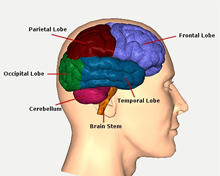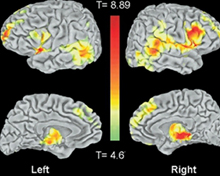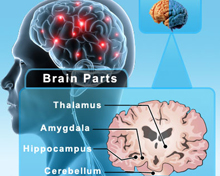Amnesia: Memory Impairment

Amnesia is mental problem in which there is partial or complete loss of memory. It is most often a temporary condition and person does not recall things which are stored in short term memory. Amnesia has many causes which range from psychological shock to brain damage by a blow to the head or conditions such as a brain tumor, a stroke or swelling of the brain. Other reasons are exposure to toxic substances such as carbon monoxide, inadequate diet, Brain tumors Seizures. Person may suffer from different types of amnesia. In anterograde amnesia, people find it hard to remember ongoing events after suffering damage to the head. They do not tend to forget their childhood or who they are, but they find difficult to remember everyday events.
Retrograde amnesia is condition in which people do not retrieve memories earlier to an occurrence in which they suffer damage to the head. Sometimes people never remember the seconds leading up to the incident. Patient of korsakoff's psychosis suffer from memory loss due to alcohol abuse. The person is able to recall things from short-term memory but he may have severe problems recalling a simple story, lists of unrelated words, faces and complex patterns.
This tends to be a progressive disorder and occur due to neurological problems, such as uncoordinated movements and loss of feeling in the fingers and toes. If these symptoms come about, it may be too late to stop drinking. In traumatic amnesia, person's brain is damage due to severe non-penetrative blow to the head, such as in a road accident. Patient with this state may be unconsciousness for a few seconds or go to coma. Infantile/childhood amnesia is a condition where person can not recall events from early childhood.
Some theories state that it is due to sexual repression. Others articulate it could be associated with language development or some areas of the brain linked to memory are not fully mature. Hysterical amnesia, also named as fugue amnesia covers episodes of amnesia associated with psychological disturbance. It is usually temporary and can be generated by a shocking incident with which the mind can not cope. Usually, the memory slowly or suddenly comes back a few days later, although memory of the trauma may remain imperfect.
Patient of amnesia have trouble learning new information, and they have difficulty recalling previously learned information. They may be disoriented and confused. Their memory deficit causes problems for them either at work, in school, or in social settings. Sometimes the memory loss is severe enough to necessitate a supervised living situation. Amnesia can affect either male or female. Amnesia can occur at any age.

Diagnosis
When people are under grip of this disease, he must consult doctor. Registered mental health professional will examine and prepare a careful personal history. No laboratory tests are needed to confirm amnesia. In diagnosing amnesia, doctors look at several factors. During a physical examination, the doctor inquires about recent traumas or illnesses, drug and medication history, and checks the patient's general health. Psychological exams may be ordered to decide the extent of amnesia and the memory system affected.
The doctor may also order imaging tests such as magnetic resonance imaging (MRI) to reveal whether the brain has been damaged, and blood work to eliminate treatable metabolic causes or chemical imbalances. It is very important to take seriously when person suffer from physical illness that contribute to amnesia. If there is any doubt about a medical problem, it is duty of the mental health professional to refer to a physician, who will perform a complete physical examination and request any necessary laboratory tests. Complicated psychological testing such as neuropsychological testing can be very useful in diagnosing amnesia.
Treatment
After identifying root causes, doctor decides what kind of treatment should be given to amnesia patients. Cognitive rehabilitation may be supportive in learning strategies to cope with memory impairment. Psychotherapy is given to people whose amnesia is caused by emotional trauma. Hypnosis may help some patients recall forgotten memories. Sometimes it is appropriate to administer a drug called Amytal (sodium amobarbital) to people suffering from amnesia. The medicine helps some people recall their lost memories. The use of hypnosis or Amytal has become controversial when it is used to help a patient recall repressed memories, especially repressed memories associated with sexual abuse. These patients are not hospitalized for treatment unless the person is at risk for harming himself/herself.
Course of Amnesia
The Course of Amnesia is variable depending upon the source of
the memory problem.
 The person's memory will improve if toxic substance, for
instance alcohol is removed. If the brain has been severely
injured, it may take weeks, months, or years for revival. In
some cases, the amnesia never goes away. Therefore, the
prognosis depends upon the degree of the brain trauma. If an
ingested substance caused the memory loss and the body can rid
itself of the offending substance without causing permanent
brain injury, the recovery is good. It is medical fact that once
the brain is damaged it may be very slow to heal, and therefore,
the prognosis can be quite poor. Person must collect detail
information from a therapist or a physician to know about
disease and adopt lifestyle accordingly for further
deterioration.
The person's memory will improve if toxic substance, for
instance alcohol is removed. If the brain has been severely
injured, it may take weeks, months, or years for revival. In
some cases, the amnesia never goes away. Therefore, the
prognosis depends upon the degree of the brain trauma. If an
ingested substance caused the memory loss and the body can rid
itself of the offending substance without causing permanent
brain injury, the recovery is good. It is medical fact that once
the brain is damaged it may be very slow to heal, and therefore,
the prognosis can be quite poor. Person must collect detail
information from a therapist or a physician to know about
disease and adopt lifestyle accordingly for further
deterioration.
Amnesia can be avoided when there is no brain injury or it can be reduced. It is advised by elders, doctors and other professionals to wear a helmet when bicycling or participating in potentially dangerous sports, using automobile seat belts, and avoiding excessive alcohol or drug use. Brain infections should be treated speedily and insistently to reduce the damage due to inflammation. Victims of strokes, brain aneurysms, and transient ischemic attacks must immediate visit to doctors for medical treatment. This disease can affect life therefore person must be cautions and keep regular watch.
Note: This information is just for knowledge of disease. If such type of medical condition develops, consult your doctor.
Articles on Health
- Laparoscopic Surgery Advantages
- Laparoscopic Surgery History
- Laparoscopic surgery Procedures
- Limitations of traditional laparoscopic surgery
- New technologies for advance laparoscopic surgery
- Non-Robotic Laparoscopic Surgery
- Robotic Laparoscopic Surgery
- Causes and remedy for dark circles in females

- Harmful impact of mobile phone on unborn baby

- Maternal health care tips

- Rheumatoid Arthritis is Most Widespread in Female
- Periodontal ailment during Pregnancy
- Anemia is prevalent in Women
- Effect of Cell phone tower radiation on human health

- Current health scenario india
- Government health policies india
- Medical facilities india
- Hospital infrastructure india
- Shortage of Medical Professionals in India
- Quality standards indian hospitals
- Indian states health statistics
- Medical expenses india
- Hospitals in Ahmedabad
- Hospitals in Bangalore
- Hospitals in Chennai
- Hospitals in Cochin
- Hospitals in Delhi
- Hospitals in Hyderabad
- Hospitals in Kolkata
- Hospitals in Mumbai
- Hospitals in Pune
- Hospitals in Coimbatore
- Hospitals in Kochi
- Orthopaedics Hospitals in India
- Diabetology Hospitals in India
- Cardiology Hospitals in India
- Infertility Hospitals in India
- Neurology Hospitals in India
- Paediatrics Hospitals in India
- Nephrology Hospitals in India
- Oncology Hospitals in India
- Antiaging foods to improve skin

- Tips for Maintaining healthy bones
- Guidelines for preventing heart disease
- Tips to reduce eye strain while working on computer
- Mental health problems among elderly people
- Health problem of piles

- Health advices for air travel

- Dealing with Allergies
- Tips for Eyes Care
- Care for Crystal Clear Skin
- Tips For Healthy Hair
- Healthy Living is The Absolute Measure of Happiness
- Let Fragrance Rule Your Summer
- Most common vestibular disorder

- Osteoporosis Risk Factors
- Dengue

- Endocrine disorder

- Causes of liver damage
- Dry eye syndrome
- Kidney Stones
- Conjunctivitis: Irritating eye disease
- Anxiety Disorder
- Causes of Brain Damage
- Hepititis B
- Knowledge of Osteoarthritis
- Mental Illness
- Back Pain
- Sugar Addiction
- Diet Control Plans
- General Motors Diet Plan
- No Carbohydrate Diet
- One day Diet Plans
- Seven day diet Plans
- Vegetarian Diet
- Food for Health
- Genetically Modified Foods
- Healing Effects Of Fruits
- Vegetables That Heal
- Healing Effects Of Spices and Herbs
- Test your Stress Level
- Mantras for Relaxation & Stress free life
- Take walk For a healthy body and mind
- Squint is frequently observed in Children
- Consult-Doctor
- Free Handy Health Advice